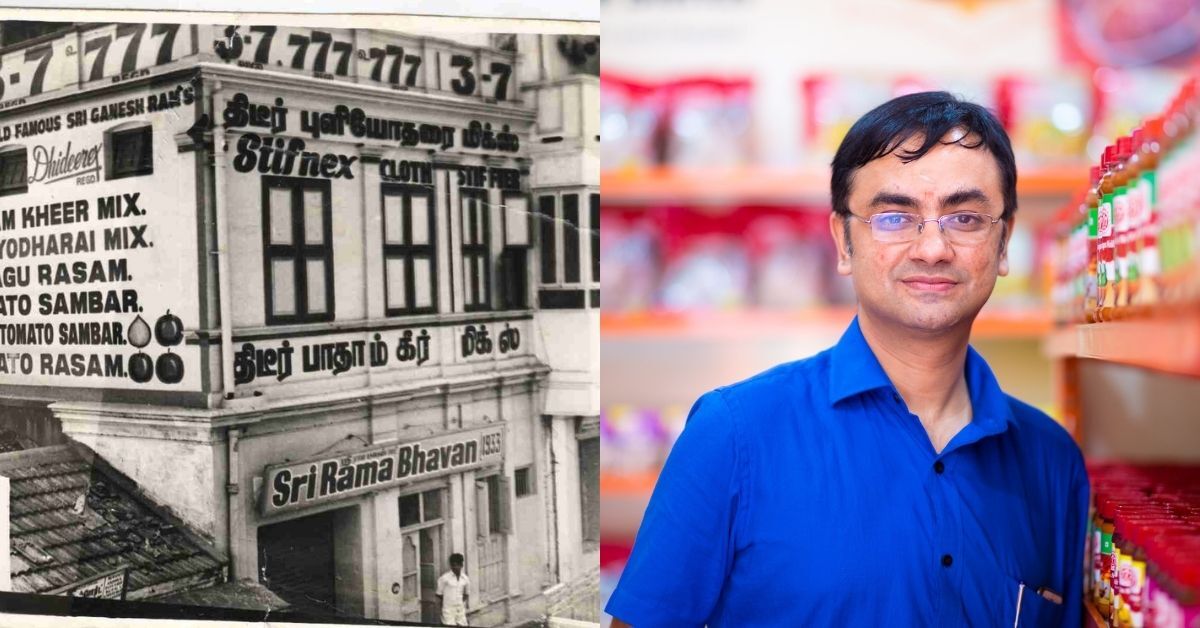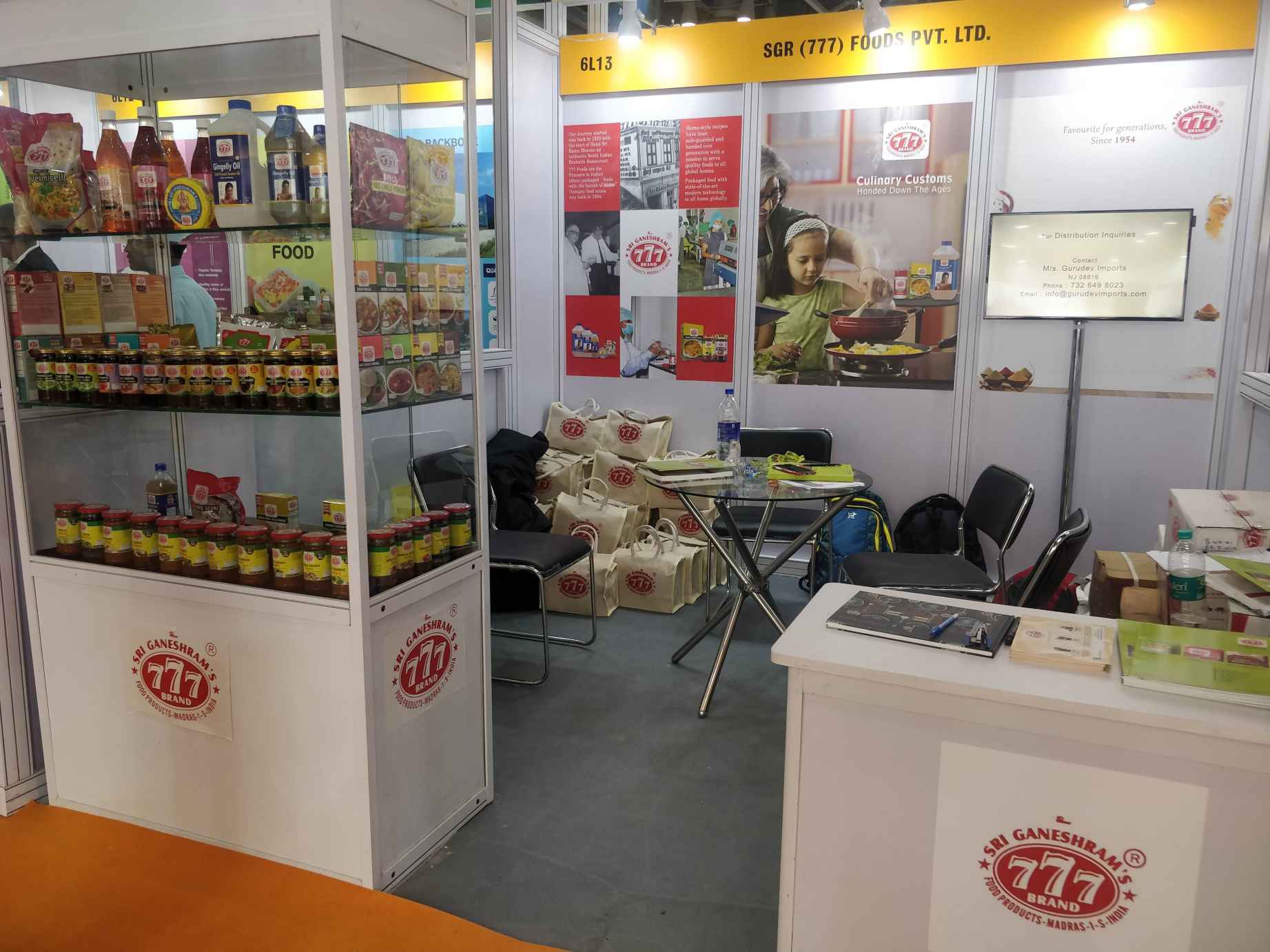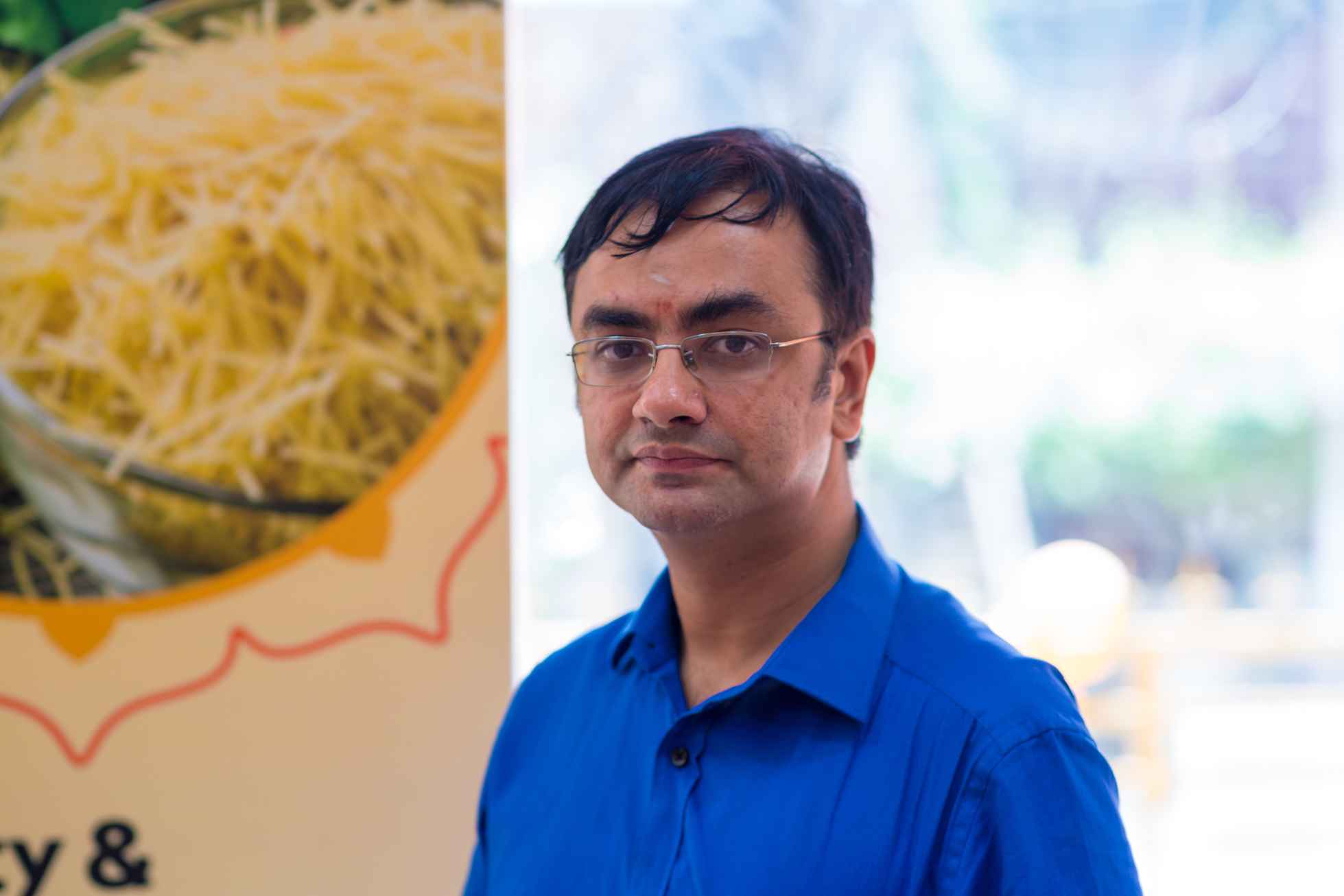777: The 88-YO Desi Brand Making Rs 60 Crore/Year via Pickles, Podis
Sri Ganesh Ram’s 777 was established in 1933 by two Iyer brothers in Chennai. Today, the Made in India brand generates revenues of 60 crore a year.

This story has its origin 88 years ago in 1933 when R S Narayanasamy Iyer and R S Ganapathy Iyer migrated to Madras in search of better opportunities. The brothers who hailed from Ramanathapuram, a small village in Palakkad, were both excellent cooks and that was the skill that they relied on to find their place in their new home.
Sri Rama Bhavan came into existence in Thambu Chetty Street in Madras (now Chennai) with just four tables to accommodate 16 people. Focusing on serving traditional food, the restaurant catered to the crowds in what was Madras’s commercial hub. Soon enough, their skills and the appreciation for the food reached far and began to attract the celebrities of that era to Sri Rama Bhawan.
For 21 years, until 1954 the brothers primarily focussed on the restaurant business.

But there were always pickles, podi (powder), papadum (papad) and chutney placed at the cash counter for sale.
Srikanth Ramani (44), a third-generation businessman and Director of one of the most famous South Indian traditional food companies today — Sri Ganesh Ram’s 777, says, “While in the beginning it was all being done without any brand name or packaging, eventually that changed. As a brand, 777 came into being in 1954 and completely changed the trajectory of everyone’s lives.”
Cutting across all barriers

It all began with a customer suggesting that the brothers brand the products and distribute them. Srikanth says, “At that time the brothers were rather clueless about brand building and getting their licenses in order. But they worked on it and applied for the requisite licenses to get the business going.” As a first step in that direction, they applied for a registration.
“The Fruit Product Order (FPO) registration number allotted to the business was 777 and that was how the brand was named,” says Srikanth. Being a numeric, the brand has had many advantages and Srikanth says that it has helped with recall value as well as establishing a presence overseas. “It cuts across all sorts of barriers – language, caste and religion,” he says.
“When the restaurant was functional, there would be many NRIs (non-resident Indians) who would visit and tell my grandfather that because they took back the pickles and podis from the restaurant, they did not miss the food back home so much,” says Srikanth. It was this sort of feedback that pushed them towards a new challenge. As early as 1958, the brand managed to export their products to the US, UK and even Australia. “The brothers started exploring other avenues too,” he says.
Growing the biz

It was in the late ’60s that R S Narayanasamy Iyer’s son, Ramani, took charge of the business and expanded it from a small home-scale venture to a larger operation. “It was under his leadership that the SGR 777 expanded to an 8000-sq-ft factory with about 40 employees. This helped grow the business and add more products to the line-up,” says Srikanth.
In 2001, Srikanth, having completed his Masters in Foreign Trade and Business Administration, entered the business and learnt the ropes from scratch. “While I wasn’t groomed to join the business, being a part of this venture has been the most exhilarating period of my life.”
One of the significant changes introduced by Srikanth was converting the partnership company into a private limited company in the year 2003. From an 8000-sq-ft factory the brand grew to occupy 3 acres of land with a production area of almost 50,000 sq ft in Gummidipoondi in Tamil Nadu, says Srikanth.
The company today boasts of having 300 employees on board. He also shut down the restaurant in 2017, after 84 years of existence, to focus on the food business.

With 10 categories of products, Srikanth says that the company has about 150 SKU’s (Stock Keeping Unit), wherein the cut mango pickle is one category and there are packs of various quantities of that pickle available for retail – each of which is an SKU. While 80 per cent of the sales come from India, the rest comes from overseas sales.
Srikanth has also employed the service of six business heads for various verticals, like sales and distribution, overseas sales, finance and accounts, quality assurance, factory operations and human resources. “I am involved in the day-to-day running of the company and also own the majority share in the business,” he says. The initial product line included various pickles, sambar powder and various chutneys.
“Ensuring that the taste remains authentic and each batch has the same flavour is the key to the business we are in,” he says. While the company does not have a dedicated in-house research and development unit, they place a lot of emphasis on quality control and checks.
Reaching kirana stores

Srikanth attributes the brand connect that they have managed to develop over the years to three main factors – taste and quality, availability and consistency. “While it is of paramount importance to maintain taste and quality, the other two have proven to be equally important. The product that you are selling must necessarily reach the smallest shop in the farthest of districts,” he says.
Today, products being available only in supermarkets and online retail platforms is not enough. Brands aim to reach kirana stores too. “The need to touch and feel the product, even if it happens to be a food item, is very high in India. We have a lot of time to go to a store and pick what we want,” he says. The company’s focus has been on strengthening the rural distribution network.
Speaking about being low-key on advertisements and social media, he says, “So far, it has been the non-availability of excess funds that has kept us from aggressively advertising. All the expansion we did, in terms of infrastructure, resources and machinery were things that I pegged as more important for the business.” The company is now foraying into advertising and building its social media presence too.
Srikanth is also actively looking to raise funds and get on board a strategic investor who shares the same vision in terms of the growth of the company.
Lockdown boom

While world over people have been reeling under the effects of the pandemic and lockdown, there have been certain companies, like 777, that have fared rather well. Srikanth says, “We did very well during the last lockdown that was imposed. People were home and forced to cook and that in turn meant that they needed the right mixes and condiments to get it right.”
As an entrepreneur, Srikanth says that with every new product that is introduced, the pride and satisfaction in doing the job increases. From running out of capital to dealing with labour issues and policy changes they have weathered it all. “Having started with 20-odd employees to today having 300 employees with us, has been such an amazing journey,” he says.
The company closed at a topline revenue of Rs 60 crores in March 2021 and the focus is to achieve a 20 to 25 per cent growth in the topline year-on-year. “I see packaged food ruling for quite some time to come. I am also confident of crossing the Rs 100 crore revenue mark in a couple of years from now and thereafter will work on getting to the Rs 250 crore revenue target,” says Srikanth.
Focus on the customer

Asked what his favourite product is and he instantly replies, “The idli molagapodi and the mango-ginger pickle, both of which you will always find in my home.”
After 67 years since its launch, Srikanth says that some of the bestsellers remain what has always worked for them. The sambar powder is the signature item on their product list and others include the idli molagapodi and even the nannari sherbet, during the summer season.
Srikanth also shares how even today, on an average he gets 5 to 10 phone calls/emails from customers who want to share feedback with him about a product that they bought.
“Given that we have been serving generations, the expectation is very high. There are times when a batch gets a tad bit spicier or has a tinge more of salt, and the customers do not hesitate in picking up the phone, calling me and letting me know. That is the kind of relationship we have built with them over the years,” he says. While there are chances of batch variation, the intent is to keep it within a 5 per cent margin. “The feedback is the fuel for the company,” says Srikanth, adding that he has food critics at home.
Srikanth’s daughters, Sriya and Sadhana are perhaps the toughest critics to please. “Both my daughters give me very clear and honest feedback. If one batch of idli molagapodi has a tinge of salt more than required, I will be told about it as soon as they take the first bite.” With a lot of pride, Srikanth shares, “I see that entrepreneurial fire in my younger daughter, who is all of 7 years of age. If she continues to show an interest, I would be happy to groom her for the business.”
To explore the 777 product line further and place an order online, click here.
(Edited by Yoshita Rao)
If you found our stories insightful, informative, or even just enjoyable, we invite you to consider making a voluntary payment to support the work we do at The Better India. Your contribution helps us continue producing quality content that educates, inspires, and drives positive change.
Choose one of the payment options below for your contribution-
By paying for the stories you value, you directly contribute to sustaining our efforts focused on making a difference in the world. Together, let’s ensure that impactful stories continue to be told and shared, enriching lives and communities alike.
Thank you for your support. Here are some frequently asked questions you might find helpful to know why you are contributing?


This story made me
-
97
-
121
-
89
-
167











